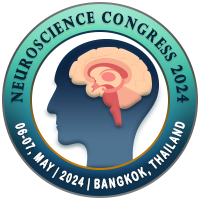
Csaba Olah
University of Tokaj, HungaryTitle: Assessment of cognitive function in female rheumatoid arthritis patients: associations with cerebrovascular pathology
Abstract
We assessed cognitive function of female rheumatoid arthritis (RA) patients and analyze the determinants, with special focus on cerebrovascular morphology. Sixty methotrexate (MTX-) or biologic-treated RA patients and 39 healthy controls were included in a cross-sectional study. Smoking habits, alcohol intake and time spent in education were recorded. Standard measures were performed to assess cognitive function (Montreal Cognitive Assessment, MOCA; Trail Making Test, TMT; Victoria Stroop Test, VST; Wechsler Adult Intelligence Scale, WAIS; Benton Visual Retention test, BVRT), depression (Beck Depression Inventory, BDI), anxiety (State-Trait Anxiety Inventory, STAIT/S) and general health status (Short Form 36, SF36). Mean disease activity (28-joint Disease Activity Score, mDAS28; erythrocyte sedimentation rate, mESR; C-reactive protein, mCRP) of the past 12 months was calculated; anti-cyclic citrullinated peptide (CCP) and rheumatoid factor (RF) were assessed. Cerebral vascular lesions and atrophy, carotid intima-media thickness (cIMT) and plaques, as well as median cerebral artery (MCA) circulatory reserve capacity (CRC) were assessed by brain magnetic resonance imaging (MRI), carotid ultrasound and transcranial Doppler, respectively. Cognitive function tests showed impairment in RA vs controls. Biologic- vs MTX-treated subgroups differed in TMT-A. WAIS, STAIS, STAIT and BDI correlated with most SF-36 domains. Numerous cognitive tests correlated with age and lower education. Some also correlated with disease duration, mESR and mDAS28. Regarding vascular pathophysiology, cerebral vascular lesions were associated with VST-A, carotid plaques with multiple cognitive parameters, while MCA and CRC with MOCA, BVRT and BDI. RA patients have significant cognitive impairment.
Biography
Csaba Oláh obtained his medical degree in 1996 at the Szent-Györgyi Albert University, and his economics degree at the University of Szeged in 2001. He is a consultant neurosurgeon, interventional neuroradiologist and clinical pharmacolist In Borsod County University Teaching Hospital . He has completed his PHD from Debrecen University, Hungary. He is Assistant Professor at Tokaj University. He has over 100 publications ( his Impact Factor 133) that have been cited over 300 times, and his publication H-index is 9. He has been serving as reviewer of several reputed journals. He was the editor of 4 medical books and also wrote 30 book chapters. He has 10 PhD students. He is an active member of 14 international scientific societies. He was Principal Investigator of 11 multicentre studies. His main area of interest: spine and brain neurosurgery, neurointerventional treatments, conservative spine treatments, laser treatments, traction treatments, complex treatment of brain aneurysms, treatment of vasospasm caused by subarachnoid hemorrhage, functional food developments, balneology.

